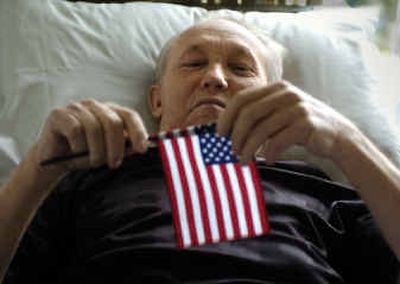Ailing refugee gets citizenship

With a letter from the president, a pamphlet on citizenship and a small American flag, the immigration officer arrived at Mikhail Zuyev’s apartment Thursday morning to fulfill the wish of a dying man.
Zuyev is 73, can no longer speak and is under hospice care after four strokes and years of diabetes and other debilitating illnesses.
He may have only a few weeks, maybe days, to live.
But before his death, the immigrant from Ukraine wanted to become an official member of the place that became his homeland six years ago: He wanted to be a U.S. citizen.
“We want to be a part of this country and this society,” his wife, Vera, said in Russian. “It was very important for us to become citizens because we wanted to be like everyone else here and share the same goals.”
Speaking through an interpreter, Vera described how much they value their new life in the United States and the hardships they endured in the former Soviet Union. The couple, along with their three children, lived in the small village of Snezhnoe in Ukraine, where Mikhail spent 42 years doing hard labor in the coal mines.
It was a miserable existence, said Vera, recalling the years of famine and the poverty they suffered when the big factories were destroyed. As Christians, they also risked persecution for believing in God.
So to come to America, to Spokane, and experience freedom for the first time as refugees, it was inevitable that they would become eternally grateful to the country that offered them hope, said Vera.
With help from Robbie Grether of World Relief, the development and relief assistance arm of the National Association of Evangelicals, Vera, 67, pursued U.S. citizenship for both herself and her bedridden husband.
Immigrants who seek to become citizens of this country but are not married to a U.S. citizen must live here for at least five years, pass civics, reading and writing exams, as well as take the oath of allegiance to the United States during a ceremony traditionally held at the federal building.
Because of his disabilities, Mikhail did not have to take the exams. Four years ago, Congress also enacted a law that provided a waiver for people with disabilities who could not understand the oath.
In order to qualify for the waiver, Grether completed the necessary paperwork, which required her to gather signatures and statements from Mikhail’s doctors. Vera, in the meantime, had to speed up the process of acquiring her own citizenship because in order for Mikhail to become a citizen, he needed a spouse or child who was also a U.S. citizen to take the oath on his behalf.
Grether, who assists refugees who want to become citizens by teaching them English and helping them prepare for the exam, called U.S. Representative George Nethercutt’s office to assist the Zuyevs. She also contacted officials with the U.S. Citizenship and Immigration Services, formerly known as the U.S. Immigration and Naturalization Service.
After passing her exam, Vera took the oath of allegiance two days ago during an abbreviated ceremony at the federal building.
On Thursday, Sandra Johnston, district adjudications officer with U.S. Citizenship and Immigration Services, arrived at the couple’s north Spokane apartment to make it official for Mikhail.
It’s rare for the agency to conduct a citizenship ceremony in someone’s home. It was also the first time that the Spokane citizenship office granted a waiver for a person with disabilities who couldn’t understand the oath.
“They were willing to make an exceptional case here,” said Grether. “This is above and beyond the call of duty.”
Vera smiled proudly, revealing several gold teeth in her mouth, as she signed Mikhail’s certificate of naturalization on his behalf. She carefully wrote her husband’s full name – Mikhail Dmitriyevich Zuyev – in the English letters she worked so hard to learn.
The group crowded around Mikhail, who lay in a hospital bed tucked into a small bedroom that was decorated with silk flowers and a painting of “The Last Supper.” Together, they recited the oath of allegiance as Mikhail weakly raised his right hand.
“Congratulations, you’re a U.S. citizen,” said Johnston.
“How do you say ‘Congratulations’ in Russian?” she asked the translator, Eugene Balakirev.
“Pos-dro-vla-yem,” he replied, slowly pronouncing each syllable.
“Posdrovlayem,” said Johnston, turning to Mikhail and handing him the American flag.
He responded with a smile.
Citizenship is something they will never take for granted, Vera said later after the brief ceremony. And although her husband will likely not live long enough to vote this November, becoming a citizen was his way of expressing gratitude for all the blessings they’ve received in this country, she said.
“We are no longer refugees,” Vera said. “I thank my God and the government of this country for providing us with the opportunity to live here.”